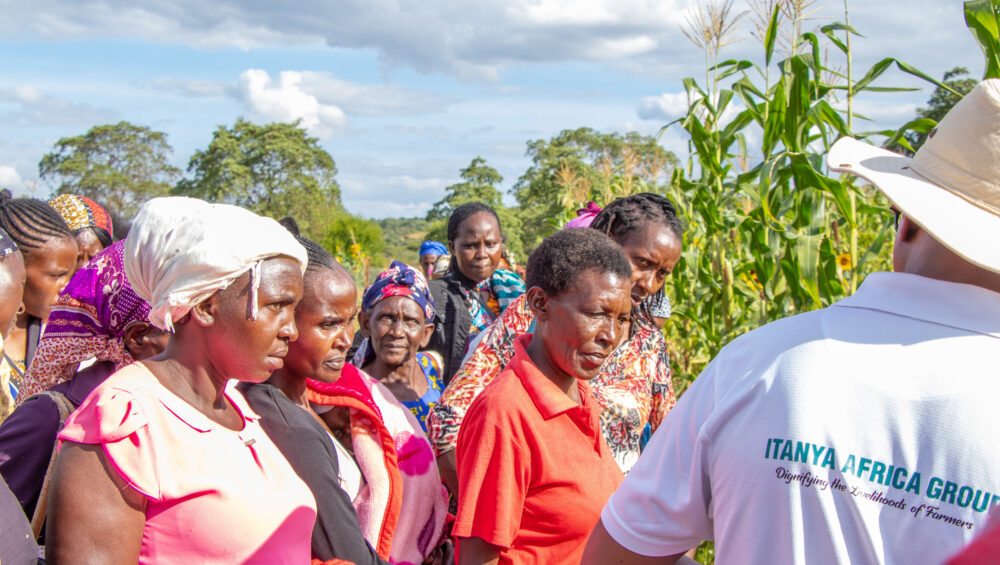Earlier this month, our team had the privilege of participating in the Climate Reality Leadership Training led by former U.S. Vice President Al Gore. His two-hour masterclass was sobering, data-driven, and most of all, urgent.
We didn’t just walk away with knowledge. We walked away with renewed conviction.
- 1–2 billion people will be displaced by 2050 due to climate-driven disasters.
- 65% of Kenyans are moderately food insecure, with women and children most affected.
- Every $1 invested in land restoration yields up to $30 in economic returns.
- Regenerative agriculture is no longer a fringe practice; it’s a frontline defense.
- A 1% drop in forest cover can cause a 10% increase in malaria cases.
These are not just numbers. They reflect the lived experiences of the women smallholder farmers we work with every day in Kenya’s lower eastern region.
Regenerative Agriculture at the Frontlines of Climate Adaptation
At Itanya, we believe that the most powerful solutions are often the most grounded. That’s why our work focuses on regenerative agriculture and syntropic agroforestry, not just as methods of farming, but as tools of survival and restoration.
From soil restoration to water conservation and seed sovereignty, climate adaptation is woven into every layer of our programming.
Our farmers aren’t just adapting to climate change; they’re actively healing their landscapes and securing food systems from the ground up.
We train farmers on:
- Syntropic agroforestry models that integrate biodiversity with crop production
- Organic composting and soil building to enhance yield without chemical inputs
- Water harvesting and irrigation through the construction of community-owned water pans
- Seed saving and traditional crop revival to increase resilience and nutritional diversity
Gender-Inclusive, Community-Led Climate Solutions
We are unapologetic in our approach to gender inclusivity. We center women and youth, not only because they are disproportionately affected by the climate crisis, but because they are uniquely positioned to lead adaptation efforts at the grassroots.
Our programs ensure that women farmers are not passive recipients of aid; they are decision-makers, trainers, and owners of the solutions.
Our Impact So Far
We’re proud of what we’ve achieved, but we know this is just the beginning. Here’s a snapshot of how Itanya Africa Group is contributing to climate adaptation and regenerative agriculture in rural Kenya:
- 160+ women smallholder farmers trained in regenerative agriculture and agroecology
- 1001+ trees planted under syntropic agroforestry systems
- 3 water pans constructed
- 17 youth engaged in meaningful climate work, earning while they restore ecosystems
- 6 climate education forums held in local communities
Each intervention is backed by data, lived experience, and a clear theory of change: when climate action is inclusive and regenerative, it becomes sustainable.
Beyond Climate Data, A Call to Act Locally
The insights from Al Gore’s session reminded us that global climate justice starts with local climate leadership. In regions like lower eastern Kenya, the climate crisis is not abstract. It is visible in every failed rain, every bare field, every child sleeping hungry.
And yet, amid all this, there is resilience. There is innovation. There is power.
At Itanya, we are walking alongside women farmers who are planting more than crops; they are planting futures.
Join Us in Building a Regenerative Future
We cannot do this work alone. If you are a:
- Donor or funding partner looking to support scalable grassroots climate work
- Collaborator or practitioner exploring community-led adaptation
- Researcher or policy advocate seeking local data and stories
- Or just someone who believes in climate justice from the ground up
We invite you to partner with us.
Whether through technical support, funding, or amplifying our message, you can be part of a movement that is turning urgency into action.
📩 Reach out to us at community@itanyaafricagroup.org

